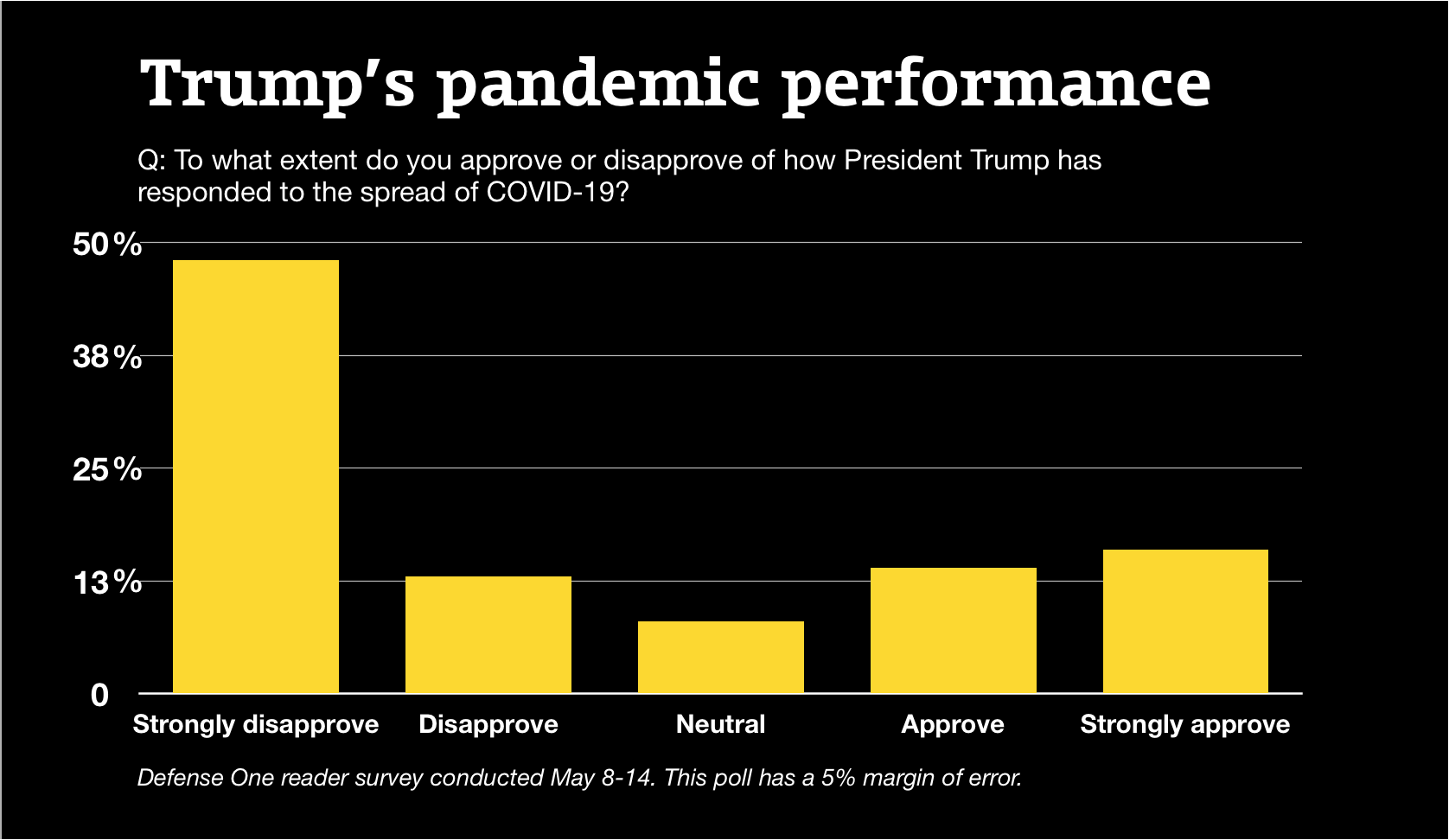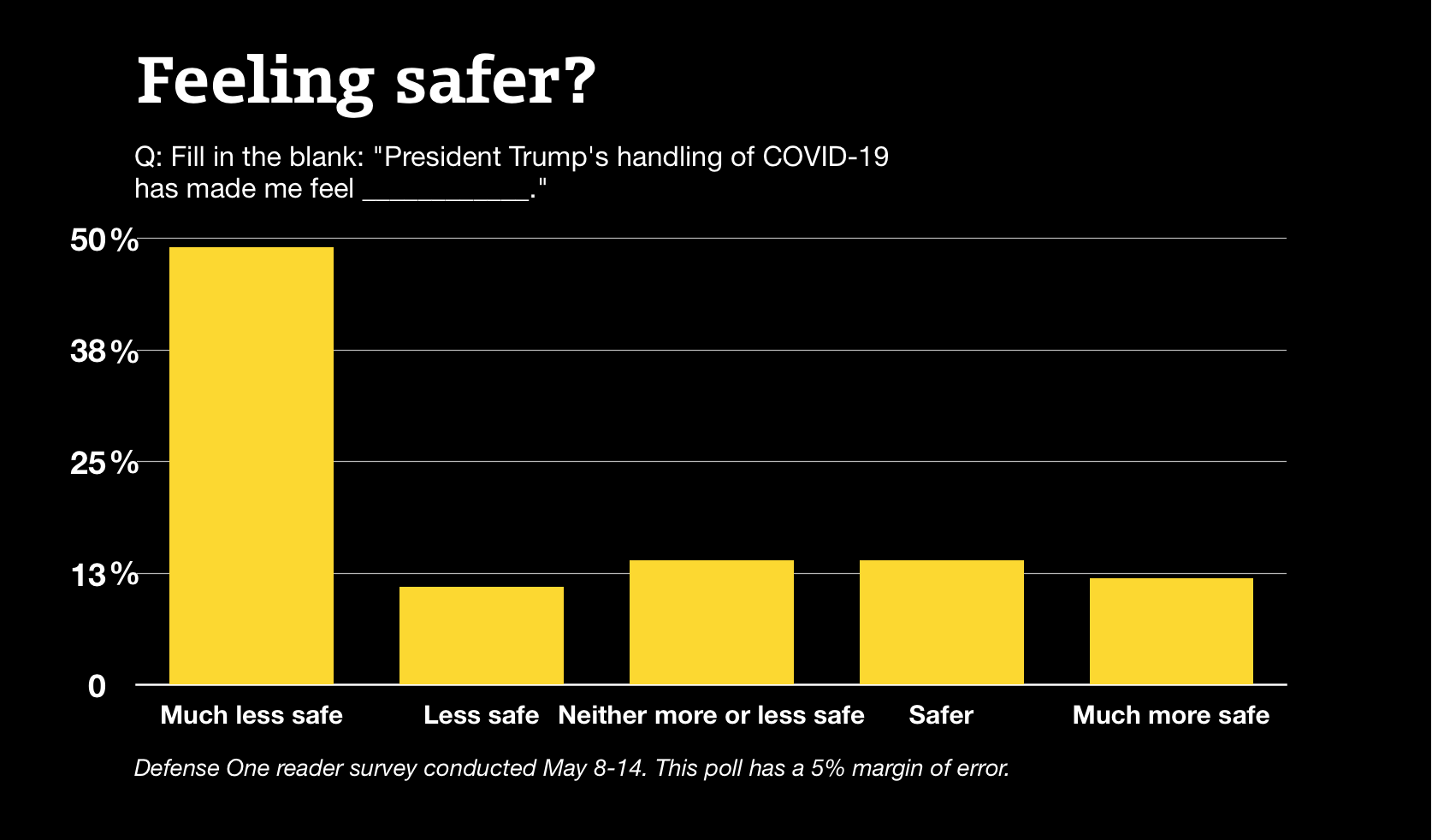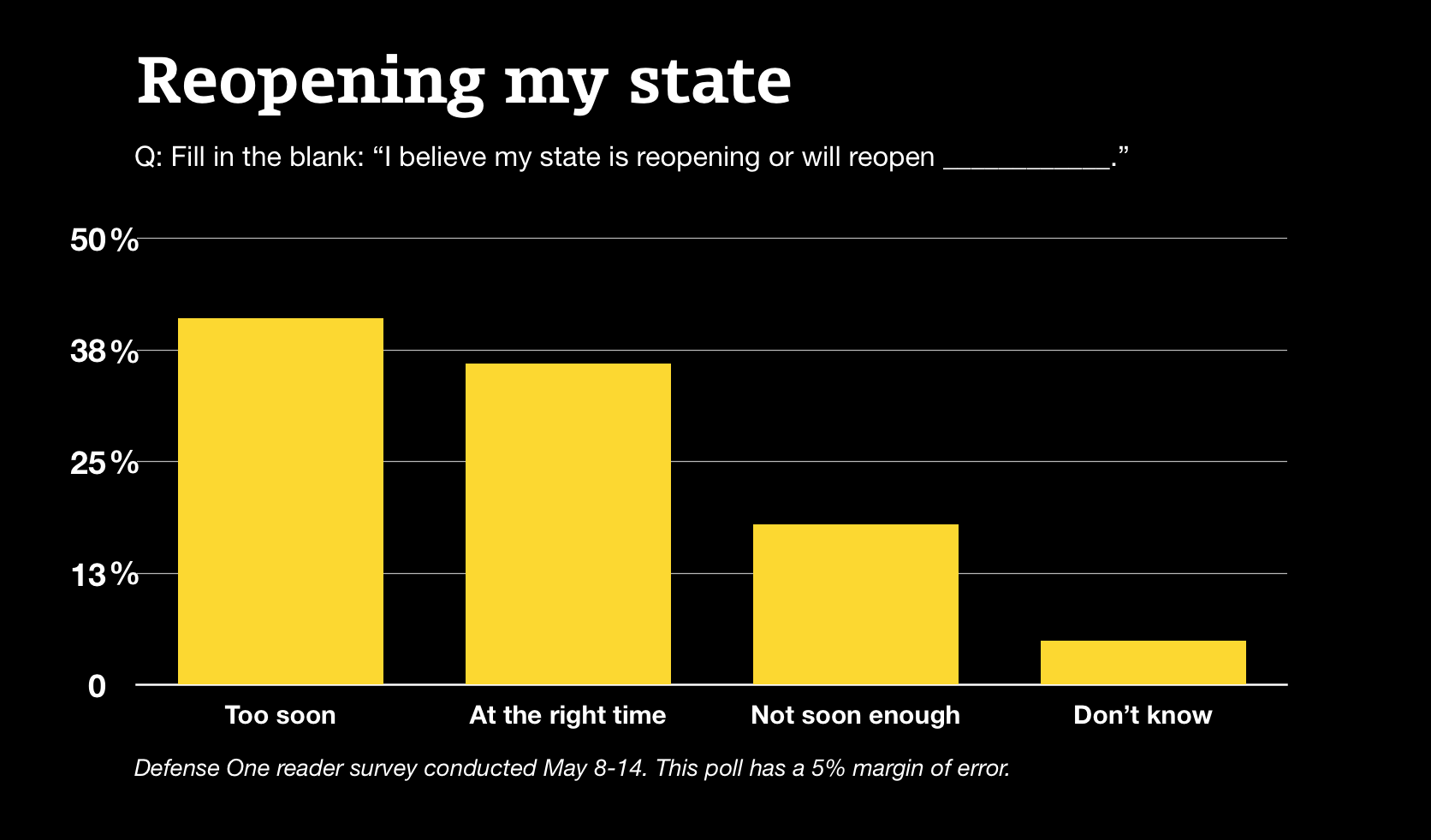
President Donald Trump speaks with reporters on the South Lawn of the White House as he departs on Marine One, Thursday, May 14, 2020, in Washington. AP Photo/Alex Brandon
62% Disapprove of Trump’s Coronavirus Response, Reader Survey Finds
Most respondents feel “less safe” because of the president’s actions. Esper gets higher marks, but many fear premature reopening.
Nearly 62 percent of respondents disapprove of how President Donald Trump has responded to the spread of the coronavirus, 88 percent said they still remain concerned about contracting COVID-19 in the coming months, and 41 percent think their state is reopening too soon, according to a survey of Defense One readers that includes federal government employees, Defense Department and military personnel, government contractors, and other private-sector workers.
Sixty percent of all respondents said that “President Trump’s handling of COVID-19 has made me feel” less safe — nearly half said “much less safe” — while only 25 percent said they felt more safe. Just 34 percent approved of Defense Secretary Mark Esper’s COVID-response efforts.

Defense One commissioned the survey, which was conducted by Government Business Council, a division of Defense One’s parent company, Government Executive Media Group. The survey was conducted May 8-14 and received 677 responses, yielding a 5 percent margin of error. Of the respondents, 362 self-identified as working in the federal community: 107 as DOD civilians or active military personnel, 135 as non-DOD federal workers, and 120 as government contractors.
Related: Coronavirus Hampering Defense Contractor Operations, Reader Survey Finds
Federal, defense, and intelligence industry workers have been a bit more insulated from the effects of pandemic-related shutdowns than other sectors of the U.S. economy. While some office spaces are closed or granting limited access, many classified or sensitive jobs prevent employees from working from home; they must continue commuting to work in secure locations. For weapons makers and other businesses related to military and intelligence activities, the Pentagon has fast-tracked dollars into supply streams, keeping many of those workers employed in factories and labs, boardrooms and battlefields. Some large defense firms are still hiring even as the rest of the country plunges into Depression-level unemployment.
Perhaps as a result, the troops, federal employees, and defense contractors who responded — call them the "federal community" — responded somewhat differently than other respondents. There is less concern about economic hardship, and slightly higher support for the COVID-response efforts of their employers and for returning to work than other the total of respondents. These workers, 37 percent of which said they are still required to travel to their workplace, also were slightly more likely than the whole group to indicate heightened concern for their own health, a family member’s health, access to testing, and mental health. They were less likely than the whole group to be concerned about financial or job insecurity, salary reductions, or healthcare costs.
Still, 61 percent of those in the federal community said they disapproved of Trump’s COVID-19 response efforts — nearly identical to the total survey result — with only 31 percent approving.
Defense Secretary Mark Esper drew less decisive ratings among the federal community, with 37 percent approving of his COVID-response efforts, 26 percent disapproving, and 36 percent remaining neutral. Esper has been criticized by lawmakers, led by Sen. Elizabeth Warren, D-Mass., who fired off a lengthy letter in April alleging that the secretary demonstrated “dangerous misunderstanding” of the virus’s threat and issued confusing guidance to the force about it.
Esper has also appeared to ignore his department’s guidelines on protective masks and social distancing. On Friday, he wore no mask when he stood next to World War II veterans in their 90s. On Saturday, Esper and members of the Joint Chiefs of Staff met without masks inside the White House’s Situation Room. Afterwards, generals were seen speaking in a close circle without masks.

The federal community gave higher marks to the Defense Department’s response than did other respondents, with 53 percent approving, 17 disapproving, and 28 percent remaining neutral.
Some 90 percent of the federal community also said the Pentagon’s guidance was some degree of helpful, but 41 percent responded that it has been only “moderately” so. Thirty percent said their manager’s COVID guidance was not in line, or hardly in line, with the White House’s.
Almost half — 49 percent — of those workers said they did not yet think it was safe to return to their normal work station, 5 points higher than all respondents. And while 31 percent of all respondents felt it was safe to return, only 28 percent of federal community workers felt so.
Similarly, nearly 85 percent of federal community respondents — five points higher than total respondents — said they were concerned “that returning to your normal work environment could place your family members at risk of contracting COVID-19.” Roughly 11 percent said they were not concerned about that risk.
Among all respondents, 41 percent said their state was opening or reopening “too soon,” while 36 percent said it was the “right time,” and 18 percent said “not soon enough.”

When offered a chance to describe other concerns about the COVID-19 pandemic, respondents mentioned personal health, frustrations with political leaders and the media, concerns about China’s advantage and a decline in U.S. world leadership, and praise for first responders. Among the responses: “Mental & emotional abuse from office supervisors,” “Loss of civil liberties,” “loss of business,” “Mental health of my kids,” “Loss of Freedoms,” “political discord-media fabrications,” “Exposure to Trump supporters in the workplace who refuse to social distance, wash hands, or wear masks,” “Destruction of the US economy & the shredding of the US Constitution,” “Can't work out at gym” and “media bull crap!!!”




